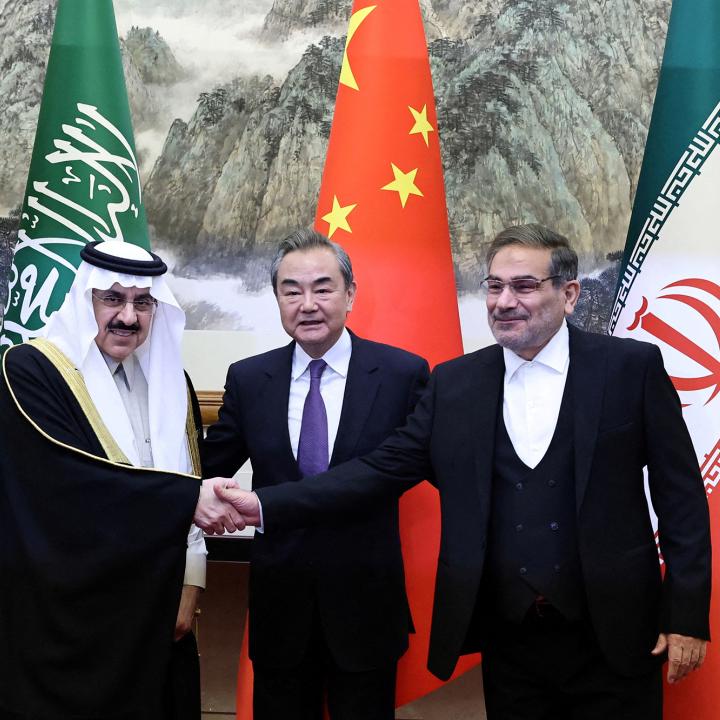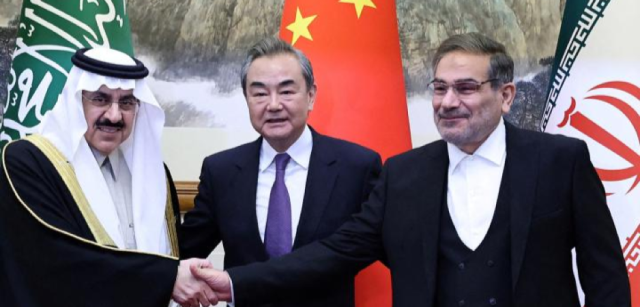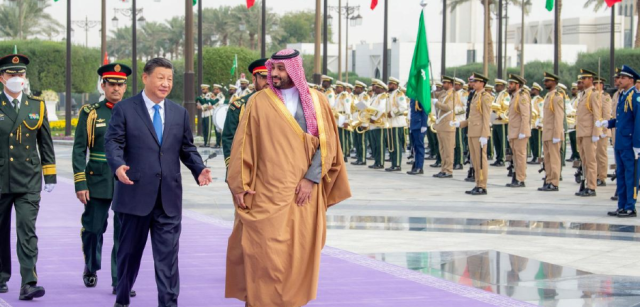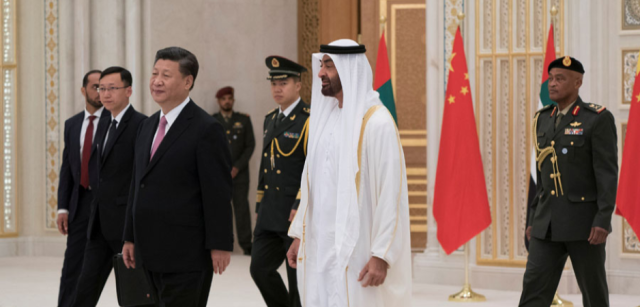
- Policy Analysis
- Interviews & Presentations
What Does the Saudi-Iran Deal Mean for the Middle East?

In a series of articles, op-eds, and media appearances, Washington Institute experts discuss what the China-brokered agreement between Tehran and Riyadh means for Iran, Saudi Arabia, and the United States.
This month’s sudden deal between Saudi Arabia and Iran to restore diplomatic relations and reopen embassies after seven years of cut ties had heads spinning in Washington. The fact that China brokered the deal had the U.S. foreign policy community even more surprised.
“I happened to have two meetings that morning with people with whom I often chat about Iran. Neither had heard the news until I told them, and both initially thought I might be kidding them.” wrote Baker Fellow Simon Henderson in The Hill. “I could see each trying to process the information, working out what it may mean.”
The deal has sweeping policy implications, from the future of Iran’s nuclear program to America’s interests in the region as well as China’s growing influence through economic and soft power.
In a series of articles, op-eds, and media appearances, Institute experts discuss what it means for Iran, Saudi Arabia, and the United States.

The Context of the Deal
China has stepped up its influence in the region in recent years, looking to gain a foothold through economic and soft power. “Beijing has been wading into Middle East diplomacy for years—most recently via President Xi Jinping’s December trip to chair regional summits in Saudi Arabia—but with little to show for its efforts,” Institute Goldberger Fellow Grant Rumley and Institute Senior Fellow Henry Rome wrote in a recent Policy Alert.
President Xi’s trip to Saudi Arabia last December was his third visit to the region as head of state. During his trip he worked on strengthening China’s relationship with Riyadh and attempted to display his nation’s economic power by having Chinese companies sign at least thirty-four agreements. Following the visit, Rumley told the Jerusalem Post that Crown Prince Muhammad bin Salman “wants Saudi Arabia to be a global power, not just a regional power, and in pursuit of that effort sees China as a key supporter.”
Iranian president Ebrahim Raisi’s trip to China in February was the first state visit in two decades. While the two nations seem interested in smoothing over any tensions, the visit only served to maintain the status quo of the relationship. Rome told CNN, “The same issues that have constrained China-Iran relations for years appear to remain.”
How Does It Affect U.S. Interests?
"The mere fact of Saudi–Iranian de-escalation is actually in the U.S. national interest.”
For over seventy years Saudi Arabia has been seen as a close ally of the United States. Hence, many in Washington saw it as a near-betrayal when Riyadh announced that China brokered the deal.
Segal Executive Director Robert Satloff wrote that Saudi Arabia resuming ties with Iran while China serves as the mediator is a “dramatic expression of this lack of confidence in the United States.” He also argued that Washington should see Riyadh’s turn to China as a “challenge for the United States to revisit its core Middle East priorities.” Simon Henderson noted that the deal may throw cold water on U.S. efforts to broker normalization between Israel and Saudi Arabia.
However, Institute Managing Director and Lane-Swig Senior Fellow Michael Singh told Politico that the United States “should not be panicking—the mere fact of Saudi-Iranian de-escalation is actually in the U.S. national interest.” Singh, the interim director of the Institute’s Diane and Guilford Glazer Foundation Program on Great Power Competition and the Middle East, also published an op-ed in the Washington Post in which he argued that China’s relationships with U.S. allies are a “new global reality U.S. policymakers need to accept.” He advocated that instead of worrying about China and telling U.S. partners not to do business with Beijing, Washington should instead “propose what business they should consider with the United States.”
For more from Robert Satloff, view his recent policy analysis.

What Does Saudi Arabia Stand to Gain?
Following protests at Saudi embassies and consulates in Iran, Riyadh announced in 2016 that it was breaking off diplomatic relations with the Islamic Republic. So why is Saudi Arabia looking to reinstate relations seven years later?
Simon Henderson wrote in The Hill that “the prevailing analysis seems to be that Riyadh has decided to work with Tehran because of the antipathy and lack of support Saudi Arabia receives from the Biden administration and Democrats in Congress.” He also explained to the Star Tribune why the deal may include Iran quelling militant attacks on Saudi Arabia.
Similarly, Robert Satloff wrote that the lack of U.S. action in response to Iran’s recent nuclear progress “was the final straw that convinced Riyadh a dramatic step was in order.” For Saudi Arabia, he argued, the deal’s purpose is “not to shift camps but to diversify sources of security.”
Grant Rumley and Henry Rome further argued that cooling the Yemeni civil war was a motivating factor for Saudi Arabia. They wrote, “Iran reportedly agreed to encourage its Houthi allies in Yemen to maintain the current year-long truce...Saudi Arabia has spent millions of dollars defending its territory against Houthi missile and drone attacks.”
For more from Simon Henderson, view his recent policy analysis
What Does Iran Get?
"Iran may perceive the agreement as a tacit endorsement of its current nuclear policy"
On the surface, it looks like the Iranians had a lot to gain from a deal with Saudi Arabia, as they continue to be generally isolated from the West and without much hope of returning to the nuclear deal. Simon Henderson marked the deal as a win for Tehran, telling Barron’s that it is “a great step forward for the Iranian position in the Middle East.”
Speaking to the Wall Street Journal, Henry Rome similarly said that the deal “starts to pierce the isolation that the Iranians were feeling in spades over the last few months.” In addition, Rome and Grant Rumley wrote that “Iran may perceive the agreement as a tacit endorsement of its current nuclear policy,” warning that if Tehran doubles down on its nuclear strategy, it will further alarm Western, Arab, and Israeli officials. They also stated that as a part of the agreement, Saudi Arabia will “soften coverage on Iran International, the London-based media outlet funded by Saudis, which Tehran has depicted as the leading anti-regime instigator throughout the recent protest movement.”
For more from Henry Rome, view his recent policy analysis

China's Power Play
In brokering the deal, China showed that it could truly be a major player in the Middle East. According to Simon Henderson, “China is the Cupid that brought the two sides together,” as it played an important role in bringing Iran and Saudi Arabia to the table. Beijing has been stepping up in the region in other ways, including by expressing interest in hosting a summit of all the Gulf countries and using its economic might to ensure attendance.
The Chinese not only gained stronger allies in Saudi Arabia and Iran, but were able to, in their eyes, undermine Washington. Robert Satloff wrote that “having China midwife the deal is an extra slap to Washington.”
Despite this, the China-brokered agreement “does not signal a new Beijing-led order in the Middle East,” Henry Rome and Grant Rumley argued. Overall, it seems that in playing a pivotal role in the negotiations, the Chinese are looking to increase their influence in the region and strengthen alliances with key Gulf partners.
For more from Grant Rumley, view his recent policy analysis
The Future of the Deal
"Something like the Saudi-Iran normalization should be judged based on the deal’s content and impact, both in the Middle East and Asia."
While experts agree that the deal will have an impact on the region, the long-term effects remain uncertain. As Grant Rumley and Henry Rome wrote, “Another open question is whether the deal will be implemented in full, and whether Beijing intends to hold each side accountable...The risks of derailment are high given the lack of trust between Riyadh and Tehran.”
These risks are also exacerbated by ongoing protests in Iran, as well as Tehran’s funding of proxy networks that could strike Saudi Arabia, further destabilizing the agreement.
Mike Singh wrote that “something like the Saudi-Iran normalization should be judged based on the deal’s content and impact, both in the Middle East and Asia.” However, only time will tell what the impact of the deal will be on Iran, Saudi Arabia, and the wider region.
For more from Michael Singh, view his recent policy analysis
Additional Resources



